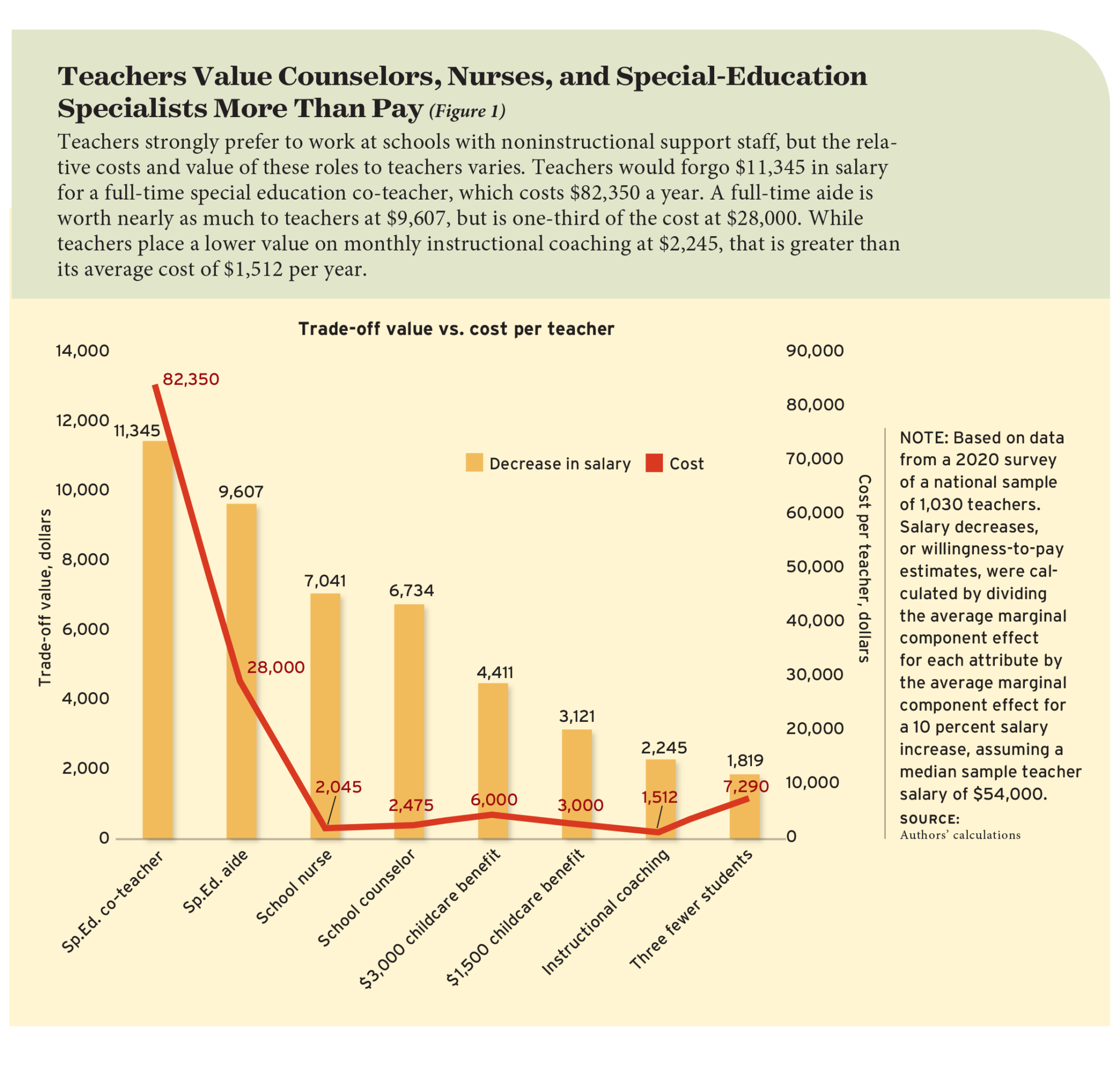U.S. teachers would trade an increase in salary for additional school support staff, such as special education co-teachers, paraprofessionals, school counselors, and nurses, according to a newly published survey.
The survey, conducted by Virginia Lovison, associate director at Deloitte Access Economics, and Cecilia Hyunjung Mo, associate professor of political science and public policy at University of California, Berkeley, suggests investing in specialized support roles may be as crucial as offering competitive pay as most of the country continues to struggle with teacher shortages.
A 2022 study by the National Education Association (NEA) found 55% of educators want to leave teaching earlier than they had originally planned due to massive labor shortages at schools.
“Our study reveals that teachers would rather trade pay raises for the assurance of support staff like full-time special education co-teachers, who help alleviate classroom burdens,” Lovison and Mo wrote. “It’s surprising just how much teachers value this kind of in-school support over additional income.”
RELATED ARTICLE: Teacher Shortages by State and How Schools Are Trying to Fix the Problem
The survey asked teachers to compare hypothetical job offers and choose which school features they prefer, including salary, school support staff personnel, class size reductions, coaching, and childcare subsidaries. Lovison and Mo said they then determined the average costs of those features and conducted an analysis to show how much teachers value them in terms of cuts or boosts to their own pay, to compare the relative values of these roles to teachers with their costs to schools and districts.
According to the survey, the 10 most attractive school profiles all had at least one counselor on staff and at least two additional sources of support, including a nurse, instructional coach, or full-time special-education co-teacher or aide.
Here are some other key findings:
- Teachers are willing to trade a 21% pay raise for a full-time special education co-teacher and 18% for a paraprofessional aide. (A 2023 Massachusetts study found students in co-taught classrooms scored higher on standardized tests than those in classrooms with a single teacher.)
- Teachers value a full-time nurse at $7,041, which is over three times the average per-teacher cost of $2,045.
- The presence of a full-time school counselor is worth $6,734 in trade-off value to teachers, more than double the cost per teacher of $2,475. The value increases for schools with two counselors.
- Teachers are willing to trade a 4.2% raise, or $2,245 in additional salary, for one hour of individual instructional coaching per month.
- The average teacher is willing to trade off a 5.8% increase in salary, or $3,121, for a $1,500 per-child benefit that is capped at $3,000 and eligible expenses like daycare and after-school programs that expire when a child turns 12. (About 43% of respondents had at least one child under the age of 12 when they were surveyed).
- Teachers are less likely to trade off pay raises for smaller class sizes, which the study says is a common area of focus in union negotiations and state legislation. The analysis shows teachers would trade $1,819 in additional salary for having three fewer students in class compared to a cost of $7,290.
“These insights suggest that school and district leaders should prioritize the hiring and retention of support staff that make classroom jobs more attractive and should consider benefits beyond pay raises to attract and retain teachers,” the researchers wrote. “Union leaders and policymakers should consider broadening their efforts to enable teachers to work alongside more school counselors, nurses, and special-education specialists.”

Source: What’s a Special Education Aide Worth? A $9,607 Raise, to the Average Teacher
Preference by School Type
Lovison and Mo also investigated differences by school type and years of experiencing. They found:
- Elementary school teachers hold slightly stronger preferences for working at a school with a full-time nurse and care more about class size and instructional coaching. (According to the Civil Rights Data Collection, 67% of elementary schools, 63% of middle schools, and 57% of high schools employ a full-time nurse.)
- Secondary teachers are somewhat more averse to taking a reduction in salary and hold slightly stronger preferences for working at a school that has counselors. (A UNH study found 65% of elementary schools, 71% of middle schools, and 79% of high schools have a full-time counselor on staff, and 11% do not employ any counselor at all.)
- Newer teachers more strongly prefer smaller classes compared to more experienced teachers. They also have a preference for schools with more support staff, which the researchers say is consistent with the notion that early-career teachers require more support.
RELATED ARTICLE: School Safety Impacts Student Achievement, Teacher Retention, New Survey Finds
Teacher Survey Methodology
The survey was taken by 1,030 teachers. In all, the teachers rated 10,300 unique school profiles. The sample is 75% female, 81% white, 85% employed at a public school, and evenly split between primary and secondary teachers.
Survey respondents, all of whom were currently working as teachers, participated in the survey between Nov. 2020 and Jan. 2021. To account for potential impact of the pandemic, the survey asked whether respondents’ choices would have been different before the pandemic. About 90% said they would be the same.
The survey was also repeated in late 2022 to account for any shifts in teacher preferences post-pandemic, with consistent findings.







